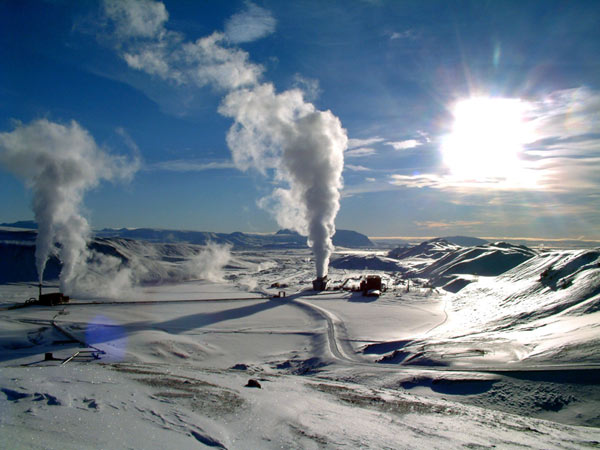hydrothermal energy

A geothermal power station in Iceland.
Hydrothermal energy is a type of geothermal energy that is generated by the heat of water and steam that is found deep underground. This heat is produced by Earth's internal heat sources, including the decay of radioactive elements and the heat of Earth's molten core, and it is harnessed through the use of specialized power plants and other technologies.
There are several different types of hydrothermal energy systems, including dry steam systems, flash steam systems, and binary cycle systems. Dry steam systems use natural steam vents to generate electricity, while flash steam systems use hot water from underground reservoirs to produce steam, which is then used to generate electricity. Binary cycle systems, on the other hand, use a heat exchange process to transfer heat from hot water to a working fluid, which is then used to generate electricity.
Advantages and challenges
One of the main benefits of hydrothermal energy is its reliability and predictability. Unlike other forms of renewable energy, such as solar and wind power, which are subject to fluctuations in weather and other environmental conditions, hydrothermal energy is consistent and reliable, making it an important source of baseload power. In addition, hydrothermal energy is a clean and renewable energy source, with little to no greenhouse gas emissions, making it a more environmentally friendly alternative to fossil fuels.
There are also several challenges to the development and use of hydrothermal energy. One of the main challenges is the high upfront costs of building hydrothermal power plants and other infrastructure, which can make it difficult for utilities and other energy providers to justify the investment. In addition, there are also concerns about the potential environmental impacts of hydrothermal energy development, such as the potential for air and water pollution, and the potential for disruption to local ecosystems.
Despite these challenges, hydrothermal energy has the potential to play a significant role in the transition to a more sustainable and low-carbon energy system. With advances in technology and a greater understanding of the environmental impacts of hydrothermal energy development, it is likely that this renewable energy source will continue to grow in importance in the coming years.
